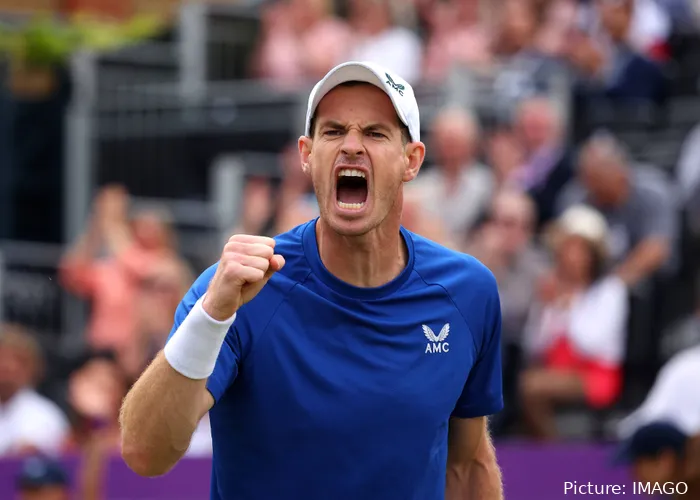
Former world number one Mats Wilander recently shared a bold prediction about the future of retired British tennis legend Andy Murray. Wilander, who himself reached the pinnacle of the sport during his career, believes that Murray has the potential to become the “greatest” tennis coach of all time. The comments come on the heels of Murray’s retirement from professional tennis following the conclusion of the Paris Olympics, where he made a final competitive appearance in the doubles category.
Wilander’s admiration for Murray is rooted not only in the 37-year-old’s achievements but also in the challenges he overcame during his illustrious career. Competing against the “Big Three” of Roger Federer, Novak Djokovic, and Rafael Nadal, Murray still managed to capture three Grand Slam titles—an extraordinary feat in an era dominated by the sport’s greatest champions. “Murray had the Big Three to deal with, and he still won three Grand Slam titles,” Wilander noted. He drew a parallel between Murray’s perseverance and that of Stan Wawrinka, who emerged victorious in three Grand Slams despite facing the same formidable opposition. Wilander highlighted the impact of coaching in Wawrinka’s success, noting that the Swiss star benefitted immensely from the guidance of Magnus Norman and Ivan Lendl.
While Wilander stopped short of outright suggesting that Murray should immediately take on a top coaching role, he expressed enthusiasm about the potential fit. “Is it a suggestion? No. But it’s a possibility that this might be the next good move for Ruud,” Wilander said, referencing young Norwegian star Casper Ruud, who has been seeking to make further strides on the ATP Tour. The Swedish legend believes that if Ruud were to work with someone of Murray’s caliber, it could significantly enhance his chances of winning a Grand Slam, particularly by refining key areas of his game like his backhand.
Wilander’s assessment of Murray’s coaching potential goes beyond mere speculation. He praised the Scotsman’s deep understanding of tennis, his ability to analyze statistics, and his relentless work ethic—traits that have characterized Murray’s entire career. “Andy, as a coach, might become the greatest coach of all time because he knows the game,” Wilander said. “He’s into stats. He physically works harder than anyone I’ve ever seen. He’s overcome these obstacles of not winning Grand Slams in his first couple of four or five Grand Slam final appearances. So yes, my call goes to Andy.”
Murray’s career accomplishments speak volumes about his expertise and resilience. He captured his first Grand Slam title at the 2012 US Open, triumphing over Novak Djokovic in an epic five-set battle with scores of 7–6(12–10), 7–5, 2–6, 3–6, 6–2. This victory marked a historic moment for British tennis, as Murray became the first British man to win a Grand Slam singles title since Fred Perry in 1936. He followed this up with a landmark victory at Wimbledon in 2013, defeating Djokovic in straight sets—6-4, 7-5, 6-4—ending Britain’s 77-year wait for a men’s singles champion at the All England Club. His final Grand Slam triumph came in 2016 when he overcame Canada’s Milos Raonic in a tense Wimbledon final, prevailing 6–4, 7–6(7–3), 7–6(7–2).
Murray’s achievements extended beyond the Grand Slams. He claimed two Olympic gold medals in singles, first at the 2012 London Games and again in 2016 in Rio de Janeiro. His victories over Djokovic in these finals further cemented his status as one of the fiercest competitors of his generation. Murray also rose to world number one in 2016, an accolade made even more remarkable considering the competition he faced during his career.
However, Murray’s journey was not without its obstacles. Persistent injuries, including hip issues that led to multiple surgeries, threatened to derail his career. Yet, he continued to battle on, often returning to the court against the odds. This determination, Wilander believes, could serve as a powerful source of inspiration and motivation for any player he coaches. “He’s overcome these obstacles of not winning Grand Slams in his first couple of four or five Grand Slam final appearances,” Wilander pointed out, emphasizing how Murray’s experience could translate into valuable lessons for future stars.
As Murray transitions away from playing, speculation is rife about how he might shape the next chapter of his tennis journey. His potential as a coach has already generated excitement, and there is little doubt that he would bring the same level of intensity, strategic acumen, and passion that defined his playing career. Whether he takes on a coaching role for a rising star like Ruud or works with a broader range of players, the tennis world is eager to see how Murray’s legacy evolves in this new capacity. With his unparalleled experience, keen analytical mind, and firsthand knowledge of overcoming adversity, Murray has all the tools to become not just a great coach, but perhaps the greatest of all time—a prospect that has fans, experts, and former legends like Wilander buzzing with anticipation.
Leave a Reply